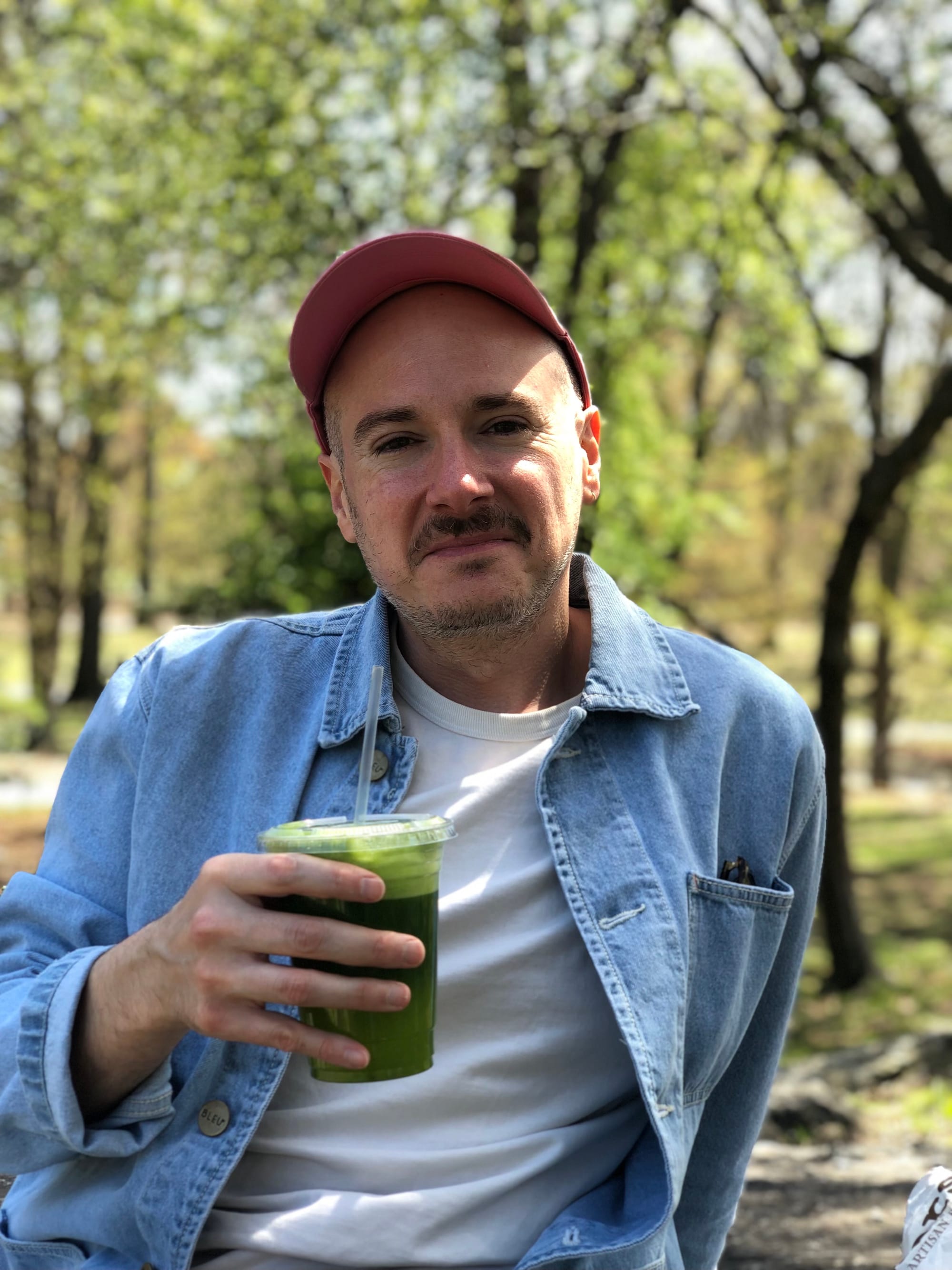About Jon
Green Juice is written and produced by Jon Schaff, a guy with an English degree and a lot of spare time.
Jon invites you to form a parasocial relationship with him.

In his own words:
My life changed when I got laid off in September, 2024. I’d been working as a marketing copywriter for a tech startup, the latest in an unbroken series of copywriting jobs for tech startups that I’ve held since graduating college.
After the layoff, I took some time to think deeply.
What I thought was: I’ve never given a single shit about my job in my entire life.
Then I thought: I should look at my phone.
That’s when I discovered Volts. Volts is a podcast by David Roberts, a climate journalist and green energy evangelist. The first episode I listened to was called How railroads could boost the US energy transition. Reader, let me tell you: it freaked my bean.
I started listening to more Volts episodes. I learned about crazy new ideas, like closed-loop hydropower, and solid-state batteries, and thermal energy networks. It wasn’t always easy to understand the material, even though Roberts does his best to dumb it down for listeners. I paused the pod often to look up unfamiliar words and phrases. I made a spreadsheet to keep track of the many, many clean energy acronyms out there. I watched and rewatched YouTube videos about how electrons work.
Eventually, I got the hang of it. And I couldn’t stop talking about it.
Except that I discovered clean energy is actually pretty tricky to talk about. There’s just so much information, so much necessary context.
A typical conversation went like this:
ME (talking too fast): “Did you know we could use the existing railroad network to do energy transmission and distribution? It would solve a ton of Grid infrastructure problems! Except the railroads—the trains and the tracks—are all privately owned, which I just learned about. Which is crazy, because they’re infrastructure! Just like our utility companies: they’re public services, but they’re beholden foremost to Wall Street! Why should we expect railroads to make a quarterly profit? But if we took public ownership of them—the railroads, I mean, but also the utilities—we could shift huge amounts of freight trucking back to rail. And almost as a byproduct, we could revitalize our small towns in the process. We’d have to electrify all the tracks, of course, but that’s actually not as hard as you might think. They’re electric everywhere in Europe. The easiest way would be a combination of catenary and battery-powered trains.”
MY NORMAL FRIEND: “Cool… do you know who Addison Rae is?”
Despite infringing on everyone in my life's limited patience, I couldn't stop talking about it. Because the more I learned about clean energy, the more I began to confront a very important, deeply unpleasant truth about myself.
I realized that I've been so afraid of climate change for so much of my life that I've refused to really process it.
I mean, I knew our planet was in trouble. I just didn’t think there was anything we could do about it. I was firmly in the “We’re screwed, game over, might as well live my life” camp that includes, it seems to me, the vast majority of Americans. So I avoided the scary headlines and PBS documentaries and climate protests like the plague.
But a funny thing was happening. I was starting to become more optimistic.
Once I understood that there are real, proven solutions available to us right now, I couldn’t stop imagining a better version of the world—one that's more just, more egalitarian, more enlightened.
Suddenly, I was feeling downright hopeful. And that hopeful epoch lasted for… a couple of weeks.
Because by then I'd started to get really, really mad. I couldn't understand why, if these amazing solutions exist, if they’re not actually that hard to implement, and if they’re orders of magnitude cheaper than proceeding with business-as-usual… then why isn’t the world changing any faster? What’s preventing humanity from coming together to beat the thing that’s clearly going to kill all of us in probably less than 150 years?
It started to feel like we were living in the cinematic universe of Game of Thrones: while the rich and powerful are busy arguing over who gets to be the king, the White Walkers march through the night, making their slow but steady progress towards the city walls.
I decided to get more involved. I enrolled in a bootcamp program called Climate Drift to get a non-podcast-based climate education. I joined a local volunteer group, Climate Changemakers, which gets together once a week to beg our elected officials to do their jobs. I got on a bus to Albany to lobby for the NY HEAT Act, an important bill that would have put an end to recklessly expanding poisonous "natural" gas infrastructure. I started canvassing for Zohran Mamdani. And I joined NYC-DSA, the Democratic Socialists of America's New York chapter, whose Ecosocialist working group fights the good fight better than just about anyone out there.
But I kept returning to the same problem. Barely anybody understands this stuff. If they did— if everybody really understood the solutions and the obstacles—then we'd do something about it. Of course we would.
I knew that I was in a unique position. Out of work, miles down the clean energy rabbit hole, I could spend a whole day teaching myself about carbon offsetting if I wanted to.
Most folks don't have that option. Most folks only have a modicum of spare brain power each day to devote to something as technical and unfamiliar as the clean energy transition.
So that's why I started Green Juice. To make easy for you, reader, to take an interest in this stuff.
I hope it gets you excited about the world we could build, if we only chose to.
And then I hope it makes you really, really fucking mad.